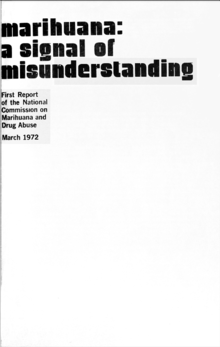Shafer Commission
 Cover page of the Shafer Report | |
| Type | Commission |
|---|---|
Chair | Raymond P. Shafer |
The Shafer Commission, formally known as the National Commission on Marihuana and Drug Abuse, was appointed by U.S. President Richard Nixon in the early 1970s. Its chairman was former Pennsylvania Governor Raymond P. Shafer. The commission issued a report on its findings in 1972 that called for the decriminalization of marijuana possession in the United States. The report was ignored by the White House, but is an important document against prohibition.
While the Controlled Substances Act was being drafted in a House committee in 1970, Assistant Secretary of Health Roger O. Egeberg had recommended that marijuana temporarily be placed in Schedule I, the most restrictive category of drugs, pending the Commission's report. On March 22, 1972, the Commission's chairman, Raymond P. Shafer, presented a report to Congress and the public entitled "Marihuana, a Signal of Misunderstanding," which favored ending marijuana prohibition and adopting other methods to discourage use. The report was republished as a Signet Books New American Library paperback in 1972.[1]
The Commission's report said that while public sentiment tended to view marijuana users as dangerous, they actually found users to be more timid, drowsy and passive. It concluded that cannabis did not cause widespread danger to society. It recommended using social measures other than criminalization to discourage use. It compared the situation of cannabis to that of alcohol.[2]
The Commission's proposed decriminalization of marijuana possession was opposed, in 1974, by the recommendations of a congressional subcommittee chaired by Senator James Eastland.[3]
The Nixon administration did not implement the recommendations from The National Commission on Marihuana and Drug Abuse. However, the report has frequently been cited by individuals supporting removal of cannabis from Schedule I of the Controlled Substances Act.[4]
Members
- Michael R. Sonnenreich served as Executive Director of the Commission.
- Dana L. Farnsworth, MD, chairman of the University of Michigan department of pharmacology (Vice Chairman)
- Henry Brill, MD, psychiatrist
- Tim Lee Carter, U.S. Representative (R–KY)
- Joan Ganz Cooney, television producer
- Charles O. Galvin, SJD, Dean of SMU Law School
- John A. Howard, PhD, President of Rockford University
- Harold E. Hughes, U.S. Senator (D–IA)
- Jacob K. Javits, U.S. Senator (R–NY)
- Paul G. Rogers, U.S. Representative (D–FL)
- Maurice H. Seevers, MD, PhD
- J. Thomas Ungerleider, MD, psychiatrist
- Mitchell Ware, JD, attorney
- Raymond P. Shafer, former Governor of Pennsylvania (Chairman)[5]
References
- ^ Clayton, Richard R; Sloboda, Zili; Page, Bryan (Winter 2009), "REFLECTIONS ON 40 YEARS OF DRUG ABUSE RESEARCH: CHANGES IN THE EPIDEMIOLOGY OF DRUG ABUSE", Journal of Drug Issues, 39 (1): 41–55, doi:10.1177/002204260903900105
- ^ "Drugs And Social Responsibility". Druglibrary.org. Retrieved April 20, 2011.
- ^ Marihuana-hashish epidemic and its impact on United States security: hearings before the Subcommittee to Investigate the Administration of the Internal Security Act and Other Internal Security Laws of the Committee on the Judiciary, United States Senate, Ninety-third Congress, second session [-Ninety-fourth Congress, first session] .. ,1974
- ^ "Nixon Commission Report Advising Decriminalization of Marijuana Celebrates 30th Anniversary". NORML. Retrieved April 20, 2011.
- ^ Drug Use in America: Problem in Perspective: Second Report. Ardent Media. 1973. ISBN 978-0-8422-7239-1.
- Sloman, Larry (1998). Reefer madness: the history of marijuana in America. Macmillan. ISBN 978-0-312-19523-6. Retrieved April 29, 2011.
NORML's job was made easier by President Nixon's Commission on Marihuana and Drug Abuse, known as the Shafer Commission.
- Hellman, Arthur D. (1975). Laws against marijuana: the price we pay. University of Illinois Press. ISBN 978-0-252-00438-4.
Further reading
- Marihuana, A Signal of Misunderstanding, Commissioned by President Richard M. Nixon, March 1972.
- The First Report of the National Commission on Marihuana (1972): Signal Of Misunderstanding Or Exercise In Ambiguity, Response article to the Shafer Commission report, by Gabriel G. Nahas and Albert Greenwood, published in the Bulletin of the New York Academy of Medicine, Vol. 50 No. 1, January 1974. From the US National Library of Medicine.
- Farnsworth, Dana L., M.D., (May 1972), "SUMMARY OF THE REPORT FROM THE NATIONAL COMMISSION ON MARIHUANA AND DRUG ABUSE: MARIHUANA: a signal of misunderstanding", Psychiatric Annals, 2 (5, ): 8–13, 16, 19–20, 25, ISSN 0048-5713
{{citation}}: CS1 maint: extra punctuation (link) CS1 maint: multiple names: authors list (link)
